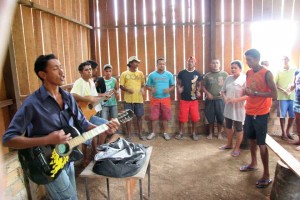Every time a new church is planted we see encouraging changes in people’s lives, including:
* Dramatic reduction in alcoholism
* Reduced instances of spousal and child abuse (sexual and physical)
* People have a renewed sense of hope and purpose in their lives.
These changes are evident and un-arguable, church plants improve communities. We don’t have a templated method, but we always start with getting to know people in a community. Here is our approach:
Although some of these communities are very small, we always seek to make friends and get to know the locals. We foster positive relationships, and although we do not hide our Christianity we do not “push” it either. If people ask or challenge us about our faith we answer simply and honestly.
We look for local people who are interested in the faith and interested in participating. Depending on the location we attempt to hold regular and frequent worship sessions (including: worship music, prayer and teaching) being hosted by our new friends.
We work with the locals to discern who may be interested in leading the church plant. As this local leader becomes more involved we disciple and support them. We help the local leader to build their church and reach out to their community. Together we look for opportunities to invite non-christians to participate in what we are doing, and for opportunities to ask questions like “tell me what you think about God.”
As this new church plant matures, so does our relationship with them – we continue to visit on a regular basis, but less often. We work with the church plant to help them become self-sufficient so that they will be able to stand on their own.
Walk with these new leaders and people of faith as they start planting new churches.
Most successful church plants may take several years to complete. Of our more then 30 church plants, currently over 25 are being run by local Brazilians who we assisted, trained and then released to run their own church.
A Church start is:
A place where people can hear the Gospel.
A place of change.
Light and salt.
A family to those who have no family or want more family.
A school for those that want to learn more about God, the Bible, the spiritual life and how it connects with everything else.
When we start a church in one of these communities, the thing that really counts is to have a local leader that can nurture these attributes. Developing local leadership is the key relationship and the most difficult relationship to grow. It can be a challenge to help someone move from no faith to a reproducing faith.
